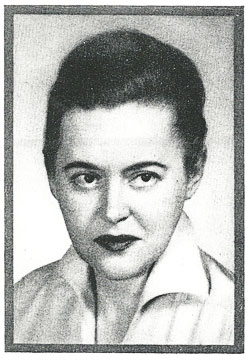Libuse Lukas Miller (1915 – 1973)
Although better known as the author of three books on theology and philosophy, this site presents her paintings and illustrations. You may download any of these for your own non- commercial use. Please cite this source if you pass them along.
The group ‘The Greatest of These’ (1943) is her response to the powerful phrases of I Corinthians 13 and, in fact, these verses were read, at her request, at her memorial service in 1973 in Gambier, Ohio. Each verse is represented by artwork that is not always immediately perceived as an illustration of the text, but nevertheless conveys her feeling for and about the message. They were intended as image/text pairings, but you have separate access to each. She had developed her watercolor skills based on the teachings of her father, a sculptor who had died in 1933. In the early 1940s, she became acquainted with Howard Thurman who, at her suggestion, wrote a series of prose poems, or meditations, and The Greatest Of These was his first published book in 1944.
Biography
Born in San Francisco, the daughter of Czech refugees from World War I, Libuse Lukas Miller trained in the physical science and psychology. She was well-versed in philosophy and, though of agnostic inclination, moved to the study of philosophy of religion and then to theology. In 1945–46 she attended Union Theological Seminary, where she studied under Paul Tillich and John T McNeill.
Her published books are:
The Christian and the World of Unbelief: A Comprehensive Critique of Modern Culture.
Nashville: Abingdon Press, 1958
In Search of the Self; the Individual in the Thought of Kierkegaard.
Philadelphia: Muhlenberg Press, 1961.
Knowing, Doing, and Surviving: Cognition in Evolution.
Hoboken: John Wiley & Sons . 1973
